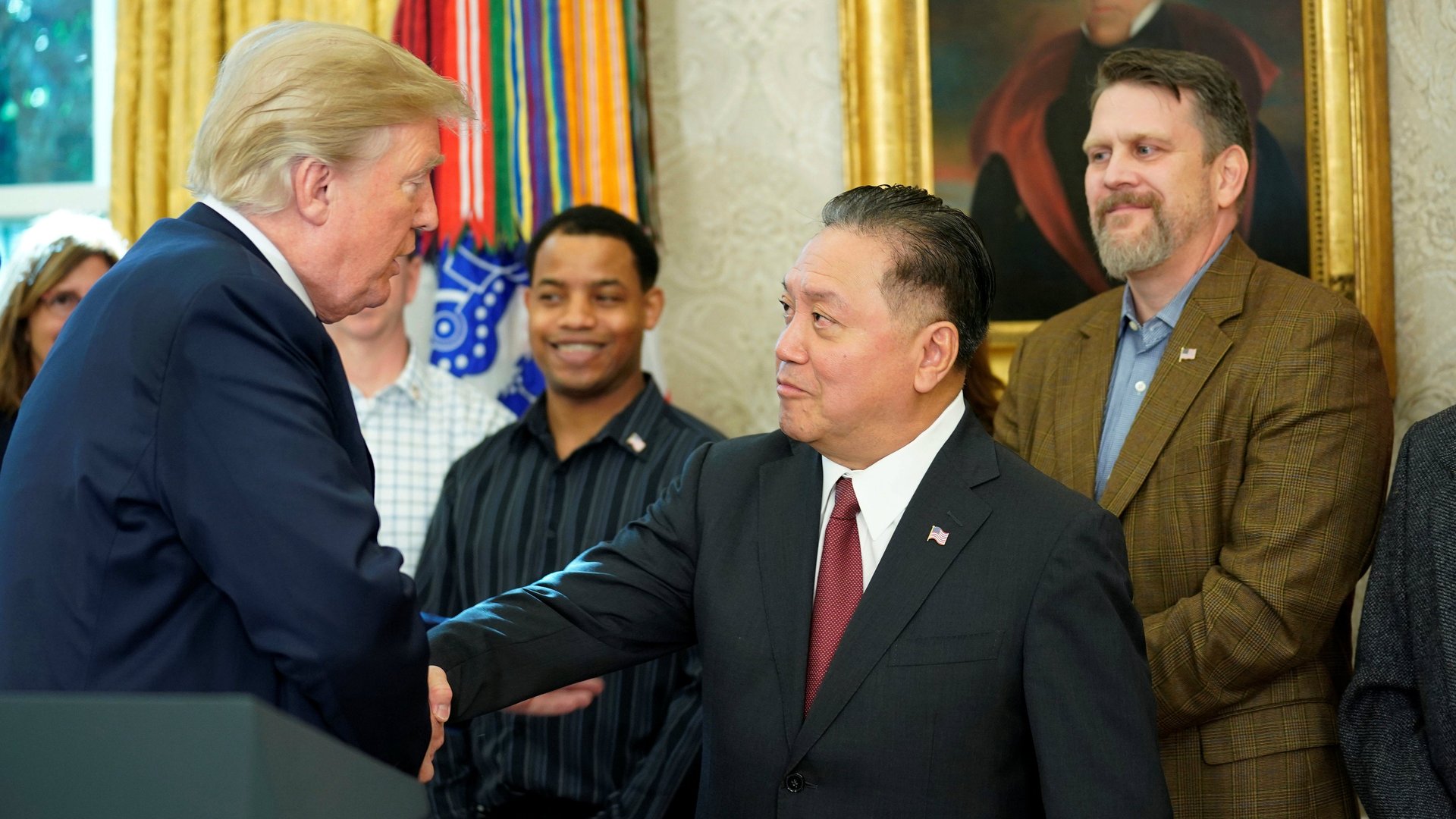US fears China winning on 5G if Broadcom gets to take over Qualcomm
Donald Trump had nothing but kind words to say about Broadcom in November. CEO Hock Tan jumped on a bandwagon and announced at the White House that his Singapore-based semiconductor company would “redomicile” to the United States, thanks to the GOP’s new tax plan.


Donald Trump had nothing but kind words to say about Broadcom in November. CEO Hock Tan jumped on a bandwagon and announced at the White House that his Singapore-based semiconductor company would “redomicile” to the United States, thanks to the GOP’s new tax plan.
In return, Trump called Broadcom “one of the really, really great companies,” and added “They employ over 7,500 workers in many states across our country. We’re looking forward to seeing that number grow very substantially, which it is now anticipated to do.”
The US Treasury Department is less enthusiastic in its appraisal of Broadcom. The Committee on Foreign Investment in the United States (CFIUS), an inter-agency branch of the department that vets cross-border deals for their impact on national security, is investigating Broadcom’s attempt to acquire Qualcomm, the American semiconductor behemoth that designs chips for countless mobile phone brands.
At roughly $130 billion, Broadcom’s hostile takeover attempt would mark the largest-ever tech acquisition in history. CFIUS scrutiny of the deal highlights the Trump administration’s more hawkish approach to trade with China.
Washington’s questions about China
Reports of Broadcom’s intent to purchase Qualcomm surfaced one day after Tan appeared next to Trump. Since then, Qualcomm has repeatedly resisted the takeover, arguing that Broadcom is lowballing its valuation.
Now Washington’s eyes are on what the deal means for China. In a letter (pdf) March 5, Aimen N. Mir of the Treasury Department states that the specific national-security concerns remain classified, adding only that they “relate to the risks associated with Broadcom’s relationships with third party foreign entities and the national security effects of Broadcom’s business intentions with respect to Qualcomm.” More generally, he argues that the takeover, if completed, would weaken Qualcomm’s competitive position as the tech industry races to standardize 5G, to the benefit of Chinese rivals.
“Reduction in Qualcomm’s long-term technological competitiveness and influence in standard setting would leave an opening for China to expand its influence on the 5G standard-setting process,” Mir writes, adding “Given well-known US national security concerns about Huawei and other Chinese telecommunications companies, a shift to Chinese dominance in 5G would have substantial negative national security consequences for the United States.”
Mir argues that Broadcom’s statements “indicate that it is looking to take a ‘private-equity’-style direction if it acquires Qualcomm, which means reducing long-term investment, such as R&D, and focusing on short term profitability.” Qualcomm holds contracts with the US Department of Defense, making it critical to national security, Mir says.
Huawei is a customer of both Qualcomm and Broadcom, using their chips for its handsets and network infrastructure. While its business has boomed in China and Europe, it been a regular target of suspicion from Washington. In 2012 the House Intelligence Committee warned telco operators against purchasing network equipment from Huawei. Meanwhile, Huawei’s plans to sell phones in the US through AT&T were recently blocked due to government intervention. Huawei’s CEO of its consumer business division said its rivals have used politics to prevent fair competition.
The Treasury letter does not directly note any ties between Broadcom and Huawei, despite singling out the latter company by name. When contacted by Quartz, Huawei described Qualcomm and Broadcom as “valued partners” and would not address further questions about the letter. Broadcom called the investigation a “blatant, desperate act by Qualcomm” to derail the takeover. Qualcomm issued a counter-statement calling it “a very serious matter for both Qualcomm and Broadcom.”
If the Qualcomm-Broadcom merger fails, it will not be the first deal to fall apart due to intervention from CFIUS. Yet it breaks from a pattern of similar attempted acquisitions.
How deals have been undone
Concerns about acquisitions of US companies in the semiconductor industry have largely stemmed from potential acquirers’ ties to the Chinese government. In September, following a recommendation from CFIUS, the White House blocked a $1.3-billion acquisition of Oregon-based Lattice Semiconductor from Canyon Bridge Capital Partners, a California-based company with an ownership structure that links to the Chinese government. Before that, in February 2016, China’s state-affiliated Tsinghua Unisplendor’s attempt to buy semiconductor maker Western Digital for $3.78 billion (paywall) fell through upon a looming CFIUS investigation.
Broadcom, however, is Singaporean, not Chinese. In fact, “Broadcom” was once an American company—a California-based semiconductor maker, which Sinapore’s Avago Technology announced it would acquire for $37 billion in 2015. Following that deal, Avago Technologies took Broadcom’s name as its own and established corporate co-headquarters in San Jose and Singapore.
CFIUS’ intervention in the Qualcomm takeover is occurring much earlier than usual. Typically, the agency will launch an investigation only once the two parties have agreed to the sale.
In January, CFIUS thwarted another high-profile tech takover when it blocked Ant Financial, a branch of Chinese internet giant Alibaba, from purchasing Texas-based remittance company MoneyGram. That rejection also marked a turning point for CFIUS, as it signaled that control of consumer data, not just computer components, mark a potential threat to national security. Fittingly, about one year before that deal fell apart, Trump met personally with Alibaba chairman Jack Ma, who pledged to create one million jobs in the United States.